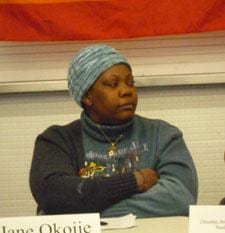Jane Okojie, a bisexual woman facing deportation back to Nigeria with her two children, had a hearing in a federal court on Dec 17.
The judge reserved his decision in the case. If the ruling goes against Okojie she could be deported immediately. If she wins she will receive a new hearing from the Immigration and Refugee Board (IRB) on whether her refugee claim will be accepted.
At a press conference on Dec 18 Okojie said that if she’s sent back to Nigeria, she and her children face persecution because of her bisexuality.
“I’m begging the Canadian government to just help me,” she said. “Consider my children. If they’re not doing it for me, do it for my children. Sending me back to Nigeria is a suicide mission for me. I won’t be able to protect my children. I don’t want my children to face torture in Nigeria.”
Okojie has been living in Canada for five years and is currently working for the City of Toronto. She has two children, a 12-year-old son and a two-year-old daughter who was born in Canada.
“I’ve been here for five years, I’ve been working,” says Okojie. “What else am I supposed to do? I feel at home when I’m in Canada.”
Okojie’s refugee claim was denied in 2003 and she has also received a negative preremoval risk assessment (PRAA) decision — which means that an IRB member has concluded it’s safe for her to be returned to Nigeria. A claim on humanitarian and compassionate grounds has also been denied.
Homosexuality in Nigeria is punishable by imprisonment of up to 14 years. The country has been criticized by human rights organizations including Amnesty International over its record of queer and other human rights abuses. In 2006 the Nigerian justice minister proposed a bill that would have made it a crime to support queer advocacy groups or participate in a same-sex marriage ceremony and banned adoption by queers. The bill was brought before the house of the national assembly but was not passed.
“What we’re calling for is a little humanity and common sense,” said Borys Wrzesnewskyj, the federal Liberal party immigration critic, at the press conference. “What seems to be happening is there’s a chill. People in positions of authority are very conscious of what happens if they make decisions contrary to the philosophy of this government.”
Olivia Chow, the federal NDP immigration critic, told the press conference the government needs to appoint qualified people to the IRB and add a proper appeals division.
“The decision-making system is not based on law or fact, it’s completely arbitrary,” she said. “If we have an appeals division, Jane wouldn’t have to go through this outrageous procedure.”
MacDonald Scott, an immigration consultant, told the press conference that IRB officers often follow their own prejudices.
“Where you have a system that’s arbitrary and unaccountable it becomes a breeding ground for homophobia,” he said. “Instead of interrogations about their sexuality we should be looking at whether they’re in danger.”


 Why you can trust Xtra
Why you can trust Xtra


